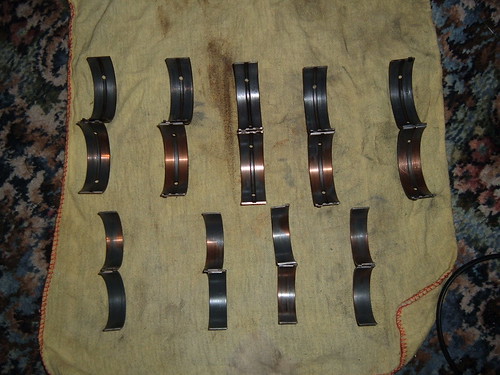Hi, I've recently acquired my first P6, a 1972 2000TC. It has been many many years since I got my hands dirty regularly with cars so I'm rusty, which I guess is preferable to the car being the same!
Anyway, this 2000TC has covered 90,000 miles and has a noisy engine. The sound is dependent on engine speed not road speed and appears to be top engine. Noises are always hard to put into words but this sounds more rotary than up & down, almost out of balance. Carbs, although worn seem ok & in reasonable balance. The noise occurs on both tickover and normal running, develops into a chirping kind of sound on the open road & can even almost disappear under light engine load when cruising at 50mph ish (I don't want to take her any faster until I know what the problem is!) . It is hard to localise but appears to originate in the head. People who have listened to the noise cannot agree on front or back, but top engine is not under dispute. Using a piece of wood as a stethoscope suggests most noise around one of the middle camshaft bearing caps. There is no obvious play in the camshaft but I did notice advanced wear to the camshaft lobes which is not yet terminal but would be a priority soon. Some valves are not opening as much as I would like. I have run the engine briefly with rocker cover removed (messy!) and oil pressure is very good indeed (said he wearing quite a bit !). There is also wear to the top cam sprocket and timing chain, but I wouldn't describe this as excessive for a 90k lump. The chain tensioner adjustment slot looks like it has reached the end of its' travel (viewed from front of car, adjusted fully to right of slot). Compression good. Spark plug colour normal & healthy.
My thoughts are 1. camshaft bearings then 2. wear to the trailing edge of the cam lobes not allowing the valves to close smoothly and 3. a breaking down of the timing chain tensioner bearing. The vehicle has not been converted to unleaded so I am using additive with every tank of Shell regular and every third tank gets 99 octane Shell Power fuel as a treat, again with additive. I am trying to decide on a plan of action for the old girl as I will need to save for extended periods prior to each stage of her restoration. Any help, comments or suggestions would be gratefully received, as would an experienced "ear" if anyone finds themself in Buckinghamshire. Also, suggestions please on the best camshafts to use for when I do get the funds to rebuild the head, and the best materials for valve guides.
Cheers, Dave
Anyway, this 2000TC has covered 90,000 miles and has a noisy engine. The sound is dependent on engine speed not road speed and appears to be top engine. Noises are always hard to put into words but this sounds more rotary than up & down, almost out of balance. Carbs, although worn seem ok & in reasonable balance. The noise occurs on both tickover and normal running, develops into a chirping kind of sound on the open road & can even almost disappear under light engine load when cruising at 50mph ish (I don't want to take her any faster until I know what the problem is!) . It is hard to localise but appears to originate in the head. People who have listened to the noise cannot agree on front or back, but top engine is not under dispute. Using a piece of wood as a stethoscope suggests most noise around one of the middle camshaft bearing caps. There is no obvious play in the camshaft but I did notice advanced wear to the camshaft lobes which is not yet terminal but would be a priority soon. Some valves are not opening as much as I would like. I have run the engine briefly with rocker cover removed (messy!) and oil pressure is very good indeed (said he wearing quite a bit !). There is also wear to the top cam sprocket and timing chain, but I wouldn't describe this as excessive for a 90k lump. The chain tensioner adjustment slot looks like it has reached the end of its' travel (viewed from front of car, adjusted fully to right of slot). Compression good. Spark plug colour normal & healthy.
My thoughts are 1. camshaft bearings then 2. wear to the trailing edge of the cam lobes not allowing the valves to close smoothly and 3. a breaking down of the timing chain tensioner bearing. The vehicle has not been converted to unleaded so I am using additive with every tank of Shell regular and every third tank gets 99 octane Shell Power fuel as a treat, again with additive. I am trying to decide on a plan of action for the old girl as I will need to save for extended periods prior to each stage of her restoration. Any help, comments or suggestions would be gratefully received, as would an experienced "ear" if anyone finds themself in Buckinghamshire. Also, suggestions please on the best camshafts to use for when I do get the funds to rebuild the head, and the best materials for valve guides.
Cheers, Dave




